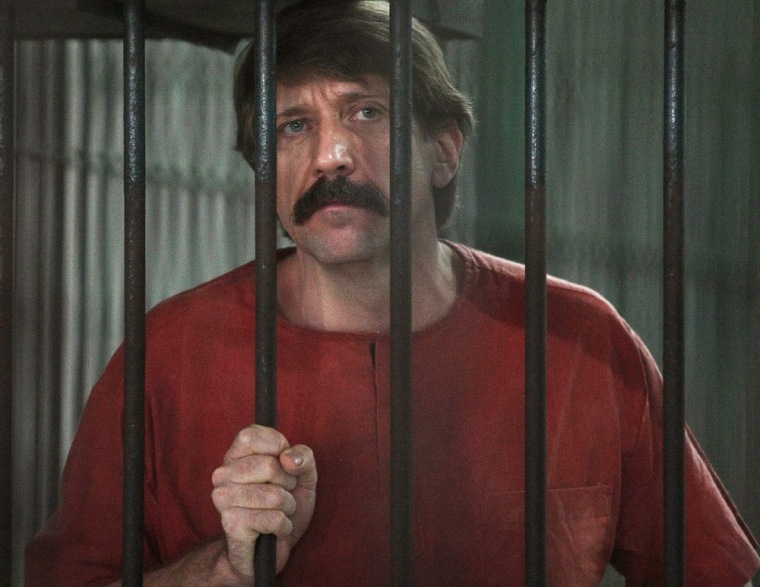Moscow on Friday slammed the 25-year prison sentenced imposed on Russian arms dealer Viktor Bout by a U.S. court, saying repatriating the man known as the “Merchant of Death” would be “one of our top priorities in Russian-American relations.”
Bout was caught in an undercover sting in Bangkok in 2008 by U.S. agents posing as Colombian guerrillas seeking weapons and later extradited to New York.
The judge said Thursday that sentencing guidelines called for a life sentence, which prosecutors requested, but said the fact that Bout's conduct was a result of a government sting operation was a mitigating factor despite his long history of arms dealing.
Russia 'not seeking revenge'
Russian Foreign Minister Sergei Lavrov said Friday that he would discuss the sentence with Secretary of State Hillary Clinton, according to Russia’s RIA Novosti news service.
“In this situation we are not seeking revenge, but want to help Viktor Bout. We are not proceeding by a desire to take revenge at any price, but by the desire to enforce the rights of our compatriot. We will actively support the appeal that Bout’s lawyers are going to file and will strive for his repatriation,” he added.
In a statement Russia’s foreign ministry said it would “take whatever action necessary to repatriate Viktor Bout back to his Motherland by any means within international law,” RIA Novosti reported.
“This issue will, without doubt, be one of our top priorities in Russian-American relations," it added.
"In spite of the unreliability of the evidence, the illegal character of his arrest involving the participation of U.S. special service agents in Thailand and the subsequent extradition, American legal officials, having carried out a political order, ignored the arguments of lawyers and numerous appeals from all levels in defense of this Russian citizen," ministry statement said.
"Long before the sentence was given to Bout, the authorities declared him the 'Merchant of Death' and almost an international terrorist, but this accusation was based exclusively on his imputed 'criminal intent,’” it said.
NY judge gives Merchant of Death 25 years
The statement, as quoted by RIA Novosti, alleged that an attempt was made to force Bout to admit he was guilty “by creating unbearable conditions for detention, by both physical and psychological means. The absolutely unacceptable campaign by the American media was aimed at influencing the jury and the judicial process in the 'right direction.'"
Reputed $6 billion fortune
In court for the sentencing hearing Thursday, Bout blurted out “It’s a lie!” as the federal prosecutor argued unsuccessfully for a life sentence.
U.S. District Judge Shira Scheindlin said 25 years was sufficient and appropriate because there was no evidence the 45-year-old Bout would have been charged with seeking to harm Americans if not approached by informants posing as Colombian rebels. The judge also ordered a $15 million forfeiture.
"But for the approach made through this determined sting operation, there is no reason to believe Bout would ever have committed the charged crimes," she said.
For nearly two decades, Bout built a worldwide air cargo operation, amassing a fleet of more than 60 transport planes, hundreds of companies and a fortune reportedly in excess of $6 billion — exploits that were the main inspiration for the Nicholas Cage film "Lord of War."
His aircraft flew from Afghanistan to Angola, carrying everything from raw minerals to gladiolas, drilling equipment to frozen fish.
But, according to authorities, the network's specialty was black market arms — assault rifles, ammunition, anti-aircraft missiles, helicopter gunships and a full range of sophisticated weapons systems, almost always sourced from Russian stocks or from Eastern European factories.
In the months before the Sept. 11, 2001, attacks, U.S., British and United Nations authorities heard growing reports that Bout's planes and maintenance operations, then headquartered in the United Arab Emirates, were aiding the Taliban while it sheltered al-Qaida militants in Afghanistan.
Bout later denied that he worked with the Taliban or al-Qaida — and denied ever participating in black market arms deals.
Reuters and The Associated Press contributed to this report.
More from msnbc.com and NBC News:
- Horns worth more than gold: Rhinos face worst year
- 'We, the people': Mali rebels declare independence
- Christian, Jewish holidays intersect Friday
- Ditch the umbrella? 20 million in England hit by drought
- Libyans flock to beaches once preserved for Gadhafi elite
- Millionaire's daughter drove looters around during London riots
- Report: US democracy workers detained in UAE
- Online coup rumors provoke China social media crackdown
Follow us on Twitter: @msnbc_world
